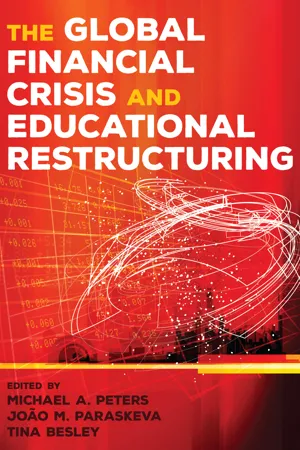
The Global Financial Crisis and Educational Restructuring
- 335 pages
- English
- PDF
- Available on iOS & Android
The Global Financial Crisis and Educational Restructuring
About this book
The worldwide integration and globalization of finance, an aspect of «financialization», coincided with the rise of market-oriented neoliberalism promoting free trade and privatization strategies. New Internet-based technologies have reinforced financial market integration, creating a fragile, globally integrated financial ecosystem that poses new systemic risks and contagion effects characterized by excessive borrowing and ballooning debt, massive asset bubbles, a huge shadow banking system, and financial innovation leading to collateralized debt obligation and securitization. Public education has been at the core of neoliberal privatization strategies and financialization with the trillion-dollar blowout of student loans. Education, once considered a national and global public good tied to the creation of knowledge and the basis of a just and democratic society, has undergone a profound transformation and financial restructuring. This collection of essays by a range of international experts addresses the root causes of this massive change, analyzing the growth of finance capitalism and financialization, as well as the financialization of education and its consequences. The book is a valuable resource for classes in educational reform, education policy, higher education, and educational finance.
Tools to learn more effectively

Saving Books

Keyword Search

Annotating Text

Listen to it instead
Information
Table of contents
- Cover
- Table of Contents
- Introduction: Global Financial Crisis and Educational Restructuring (Michael A. Peters, Tina Besley, and João Paraskeva)
- Chapter One: A Permanent Economic Emergency (Slavoj Žižek)
- Chapter Two: Finance Capitalism, Financialization, and the Prospects for Public Education (Michael A. Peters and Tina Besley)
- Chapter Three: Financialisation, or the Search for Profits in the Sphere of Circulation (Costas Lapavitsas)
- Chapter Four: The OECD on FIRE: Financialization and Socioeconomic Decline in Advanced Economies (Jacob Assa)
- Chapter Five: Financial Governmentality: Wealth-Effect as a Practice of Social Control (Stefano Lucarelli and Emanuele Leonardi)
- Chapter Six: The Embers of Truth in the Ashes of Finance (Campbell Jones)
- Chapter Seven: Instrumental Reasoning qua Capitalist Rationality: The Embedding of Capitalism within Educational Discourse (Howard Gibson)
- Chapter Eight: Financial Fantasy Documents and Public Learning: The Case of the U.S. FinancialCrisis Inquiry Report (James Reveley and John Singleton)
- Chapter Nine: The Rationality Crisis in U.S. Higher Education (Clyde W. Barrow)
- Chapter Ten: Neoliberal Pedagogy of Debt vs. Debtor Pedagogy: The New Neoliberal Commodities (João M. Paraskeva and Sheila L. Macrine)
- Chapter Eleven: Crowding Out Knowledge: Efficiency, Innovation, and Higher Education (Sharon Rider and Alexandra Waluszewski)
- Chapter Twelve: Who’s Afraid of Public Financial Literacy? (Shanti Daellenbach)
- Chapter Thirteen: Financialization and the Production of New Financial Elites through Business Education (Sarah Hall)
- Chapter Fourteen: Education and the Crisis This Time (John Morgan)
- Chapter Fifteen: Finance-subjectivity: Thinking through the Consequences of the Global Financial Crisis in Education (David R. Cole)
- Contributors
- Name Index
Frequently asked questions
- Essential is ideal for learners and professionals who enjoy exploring a wide range of subjects. Access the Essential Library with 800,000+ trusted titles and best-sellers across business, personal growth, and the humanities. Includes unlimited reading time and Standard Read Aloud voice.
- Complete: Perfect for advanced learners and researchers needing full, unrestricted access. Unlock 1.4M+ books across hundreds of subjects, including academic and specialized titles. The Complete Plan also includes advanced features like Premium Read Aloud and Research Assistant.
Please note we cannot support devices running on iOS 13 and Android 7 or earlier. Learn more about using the app